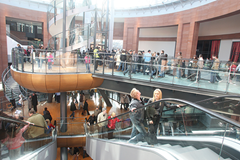The census debate
 agendaNi considers the political and social responses to the 2011 census and the future format of the survey.
agendaNi considers the political and social responses to the 2011 census and the future format of the survey.
Much of the debate around the 2011 census focused on religion and politics but others took a broader view and pointed to the changes in the economy and family structures which it reports.
Commenting in advance, Sinn Féin’s John O’Dowd predicted that “those figures will demonstrate very clearly the constitutional trajectory that we are set on.” When the results were published, though, Conor Murphy commented that the results were uncertain and the only way to clarify them was a border poll.
In the SDLP’s view, the numbers showed that Northern Ireland was a shared society. “The census shows that the identity of people belongs to nobody but the people,” Conall McDevitt stated.
Speaking for the DUP, Nigel Dodds pointed to “a sizable and growing number of people who are proud of their Northern Ireland identity.” Dodds, a former Finance Minister, wanted the census to determine where resources could be best directed to meet need, especially for the unemployed and those living with chronic conditions or disabilities.
UUP leader Mike Nesbitt focused on the national identity question and stated that the Northern Irish block was “clearly comfortable with the constitutional status quo.” Coming from Northern Ireland was now seen as “a badge of honour” rather than having the stigma associated with the Troubles.
Alliance MLA Chris Lyttle surmised that the province had a “uniquely diverse population” that required “unique and balanced expressions” of identity and “strong political leadership to deliver a peaceful and shared society for all.”
Catholic Church spokesman Father Edward McGee said that the statistics “illustrate that we are all living in a dynamic and changing society” and highlighted “some of the challenges faced by the church in an increasingly secular society.” The Catholic Church planned to study the northern census and other religious surveys in detail and was also exploring new ways “to support and nurture religious faith and practice.”
Evangelical Alliance spokesman David Smyth remarked that the “character of our society” in 2021 was the most important question to consider: “As we look to the next 10 years, we encourage public leaders, whether political, civil or church, to invest in building good relationships, strong families and a volunteer ethos in our whole community.”
ICTU Assistant General Secretary Peter Bunting praised the census for providing policy-makers and those seeking to influence policy with reliable information.
“The census cannot be easily spun to suit a party or commercial line,” he stated. “For example, it was the 2001 census that revealed the true extent of segregation across Northern Ireland, at a time when too many were feeling complacent about sectarianism after the Good Friday Agreement.”
Bunting added that the 2011 census “tells us much about the realities of the labour market,” including the 16.8 per cent share of the population who had never worked.
“The census tells us how divided we remain but also how diverse we are becoming,” he stated. “It snubs wishful thinking and is a reminder that evidence, and not ideology, ought to be at the heart of decision-making.”
A Cabinet Office spokesman said that the Government “believes that the census, in its current form, is outdated.” He suggested that improvements in technology and administrative data sources “offer opportunities to either modernise the existing census process, or to develop an alternative by re-using existing data already held within government.”
No decision had been taken but a proposal would be published in 2014. However, an Office for National Statistics spokeswoman told agendaNi: “Without census data, the ability to make informed decisions would be severely hampered.” As statistics policy is devolved in Northern Ireland, the Executive is free to make its own decisions. Abolition here is unlikely as the census contents are highly valued by ministers, civil servants and the political parties.





